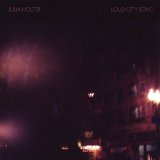 Californian singer-songwriter Hannah Cohen’s debut album “Child Bride” was released in 2012 and probably passed you by. “Pleasure Boy”, its follow-up, may not be the most eagerly anticipated release of 2015 but to let it slip under the radar unheard would be a crying shame. Where “Child Bride” was predominantly acoustic, withdrawn and reflective, Hannah Cohen’s follow -up has an omnipresent and altogether darker hum to it which underscores the prettier tracks creating a welcome assertiveness whilst also benefiting from a sonic diversity not heard on her debut.
Californian singer-songwriter Hannah Cohen’s debut album “Child Bride” was released in 2012 and probably passed you by. “Pleasure Boy”, its follow-up, may not be the most eagerly anticipated release of 2015 but to let it slip under the radar unheard would be a crying shame. Where “Child Bride” was predominantly acoustic, withdrawn and reflective, Hannah Cohen’s follow -up has an omnipresent and altogether darker hum to it which underscores the prettier tracks creating a welcome assertiveness whilst also benefiting from a sonic diversity not heard on her debut.
The theme of “Pleasure Boy” is romantic betrayal. Cohen has been clear that this concise, eight track album was born out of the debris of a bad breakup and the boy of the title, all fun but commitment-phobic, seemed to cause her considerable but not irreparable damage. Produced again by Thomas Bartlett aka Doveman, a musician in his own right with collaborations with The National, Antony and the Johnsons and Martha Wainwright, the introduction of beats and a recurring synth-pop feel are satisfyingly immediate under his supervision. Classical arrangements, jazz and trip-hop also slip in and out of earshot and are anchored by Cohen’s skilled, subtle song writing.
“I’ll Fake It” has a rogue synth line that will snake into your left ear; “Pleasure Boy” is an album that benefits from headphone use, dominant bass and a thumping, knocking percussion. ‘I know a good girl when I see one, and this one’s out for blood’ insists the pop chorus which is the album’s most blatant attempt at a commercial sound. “Watching You Fall” will inevitably draw Lana Del Rey comparisons: ‘I’m no kid, I’ll take you apart’ where Cohen’s voice is still disconcertingly coy and seductive and swaggering atop the rolling beats and Angelo Badalamenti style strings. “Take the Rest”, by comparison, with its wheezing synth hook, diverts into a warm and layered jazz-pop chorus.
“Claremont Song” is deliciously lush and heartbreaking with woodwind instrumentation and every crucifying word audible: ‘sing me the most beautiful thing that you could ever sing, now hurt me more until nothing else hurts then walk away from me’. The flip side to this self-punishing ritual, and they effectively lie back-to-back in the album’s track listing, is the appropriately titled “Queen of Ice”. Cohen suspended by demonic and hushed noises-off, and a staccato sax riff adding further tension; this jazzy noir is indeed possessed, rebuilding strength maybe, but at what cost? “Baby” ends the album with an acoustic piano and guitar in a throwback to the more singular sound of her debut.
Structured more like an extended, EP as opposed to an album with its total running time at just over thirty minutes, “Pleasure Boy” could not afford to carry dead wood and Hannah Cohen has seen to it that any slack has been trimmed right back. Beautifully crafted, devastating on occasion but relatable and delivered with a supreme lightness of touch. Do yourself a favour and make certain you seek this one out.
 Julia Holter is still an experimental artist but this, her third album, puts her voice in a clear spotlight with the fog of last year’s outstanding “Ekstasis” having almost completely cleared with a brightness and more straightforward mood taking its place. With Holter straightforward equals a concept of sorts that references “Gigi” the book, film and musical which starred Audrey Hepburn in the title role and also contemporary celebrity culture. It’s interesting that” Loud City Song”, her most accessible album to date, shares themes that have already been appropriated by pop queens Madonna and Lady Gaga but rest assured neither generation of pop icon is likely to make an album that sounds anything like “Loud City Song”.
Julia Holter is still an experimental artist but this, her third album, puts her voice in a clear spotlight with the fog of last year’s outstanding “Ekstasis” having almost completely cleared with a brightness and more straightforward mood taking its place. With Holter straightforward equals a concept of sorts that references “Gigi” the book, film and musical which starred Audrey Hepburn in the title role and also contemporary celebrity culture. It’s interesting that” Loud City Song”, her most accessible album to date, shares themes that have already been appropriated by pop queens Madonna and Lady Gaga but rest assured neither generation of pop icon is likely to make an album that sounds anything like “Loud City Song”.
An angelic acapella cry of ‘Heaven’ is the first thing heard on “World” which slowly introduces piano and then strings with lyrics about hiding behind the brim of your hat in a city that’s too interested in you. She wants to live in a city, in her apartment block on the fifth floor, but is exhausted and bored by the intense scrutiny of strangers. Like many of the songs here, this starts quiet and pure but becomes increasingly crowded and tense as things progress. Like the climate in her native LA, occasional volatile moods can disrupt the calm but the release is restorative.
Maxim’s was the restaurant favoured by judgemental Parisian society featured in “Gigi” and there are two variations of a song named after it here which form the foundations that the remaining material sits upon. “Maxim’s I” is played in slow motion, dreamy and not fully conscious; it toughens up for a piano and violin-pricked middle eight and then dissolves again. Later on in the album “Maxim’s II” is experiencing the restaurant when it’s reservations only, noisy and overly stimulating with snatches of isolated senseless conversations ‘Tonight the birds are watching me, do they have more important things to do?’. It has a big beat and is sung-spoken by Holter in a way that is reminiscent, as is the whole track, of art-pop Grande Dame Laurie Anderson during her most commercially successful, early eighties period.
“Horns Surrounding Me” starts with a recording of a man running and breathing heavily, being chased by what can be presumed to be the paparazzi. It doesn’t disappoint with its horns pay off and is sonically grand and classical in a traditional sense. “Hello Stranger” is a cover of the Barbara Lewis r’n’b classic from the early sixties and Holter treats it as an ironic David Lynch Julee Cruise standard. Suspended keyboards and haunted vocals leading to eventual confusion and distress which is continued through to the plaintive, Angelo Badalamenti-like piano ballad “He’s Running Through My Eyes”. The throbbing double bass and deadpan repetition of the line ‘there’s a flavour to the sound of walking no one ever noticed before’ of “In the Green Wild” is all quirk and twitch in the best possible sense.
“Loud City Song” is certainly Julia Holter’s most musical album to date and is structured in a way that is, more than anything, typical of a musical play, much like its reference points. It is simultaneously very old-fashioned in its use of instruments and arrangements and modern in the way it stops short of any clear categorisation. The songwriting itself is maybe less evolved than “Ekstasis”; nothing quite matches that album’s “In the Same Room” for simplicity and immediacy, but its strengths lie elsewhere. As an artist Holter and her LA-based work keeps moving forward at a tireless, restless place and on “Loud City Song” she has made something that is intimate, warm and far more approachable than ever before.


